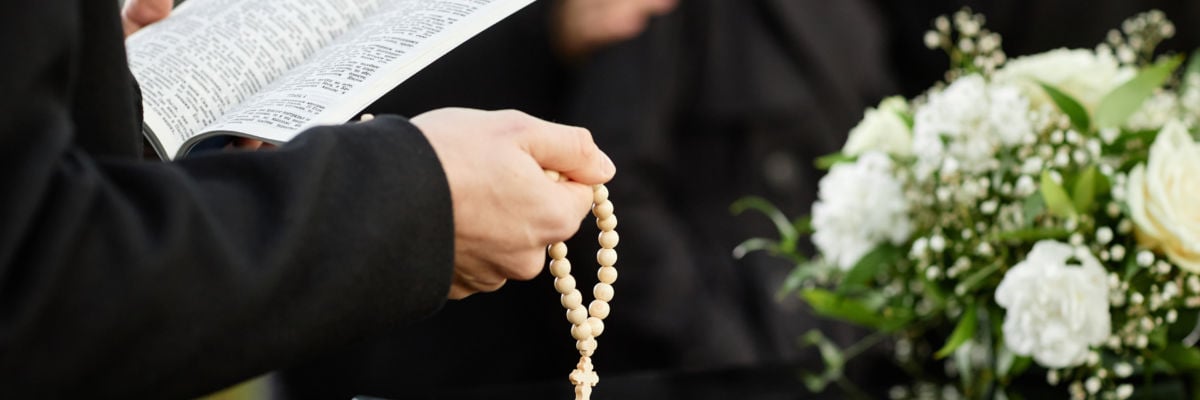
In June of 2017, Bishop Thomas Paprocki of Springfield, Illinois decreed that those who die without repenting of being in same-sex relationships were to be withheld funeral rites.
Some of the more histrionic responses made it sound as though Paprocki had told churches to unceremoniously throw the bodies of LGBT people into unmarked graves. The president of Dignity USA said, “This document is mean-spirited and hurtful in the extreme,” while New Ways Ministry said the bishop’s promise to punish those who violate his directive “borders on spiritual abuse.” Fr. James Martin, on the other hand, merely chose to retweet a piece from the National Catholic Reporter with the headline “The scandal may be in not holding funerals for gay spouses, theologians say”—which implies that the real scandal is the bishop’s original directive.
These cases involve the application of the Church’s teaching on scandal. Let’s use the context of funerals to investigate the teaching.
One reason funerals can involve scandal is because of the temptation to turn them into miniature canonization sessions. Given the grief of the deceased’s loved ones, it’s understandable that they may find comfort in talking about their loved one already being in heaven. But the primary purpose of Catholic funerals is to pray for the deceased because we do not absolutely know if they died in a state of grace. Or, if they did, we do not know how much purification they need before they are able to enter into heaven (CCC 1030-1031).
That’s why the General Instruction of the Roman Missal says, “At the Funeral Mass there should, as a rule, be a short homily, but never a eulogy of any kind” (382). The late Cincinnati archbishop Daniel Pilarczyk once put it this way: “The funeral liturgy is a celebration of salvation and mercy, of grace and eternal life. It is not meant to be a commemoration (much less a canonization) of the person who has died. Extended remembering of the deceased often results in forgetting the Lord.”
Along with serving the deceased through our prayers for them, a Christian funeral can inspire those who have separated themselves from God through mortal sin to reconcile with God as soon as possible. The presence of the deceased tells them, Memento mori: remember that you will die, too! But if people see the hope of salvation being discussed in the context of someone who never repented of a grave sin like sodomy, adultery, robbery, or murder, then they may come to the erroneous conclusion that even if the Church says these behaviors are sinful, they can’t be so sinful as to risk anyone’s salvation.
But in an editorial in the National Catholic Reporter, Todd Salzman and Michael Lawler take issue with the idea that funerals for couples in same-sex “marriages” would result in scandal:
Wherein lies the scandal in the case under discussion? Is it in permitting a church funeral to a deceased same-sex partner that would lead others to engage in homosexual behavior, or is it in the behavior of the bishops directing priests to deny a church funeral to a deceased spouse in a same-sex marriage that would lead others to engage in discriminatory attitudes and behaviors toward same-sex couples in specific, or members of the LGBT community in general?
Salzman and Lawler say the greater harm is the possible “scandal” that people will think the Church discriminates against people who identify as LGBT. According to them, a morally wrong behavior like sodomy “is not always morally bad if it is done with a good attitude.”
The authors reach this startling conclusion by noting that the Catechism defines scandal as “an attitude or behavior which leads another to do evil” (2284). They claim that attitudes are either always good (promoting justice) or always bad (seeking vainglory). They then say that, depending on the attitude, as well as a well-informed conscience, a wrong behavior may not be morally bad and may even be morally good. If the behavior is not morally bad, it follows that there is no grave sin and, therefore, no legitimate public scandal.
According to the Code of Canon Law, “deceased members of the Christian faithful must be given ecclesiastical funerals according to the norm of law” (1176.1). This also includes catechumens who die before they receive the sacraments of initiation, like baptism and confirmation (1183.1). If a bishop deems it appropriate, a funeral can also be given to children who died before being baptized or even, in some cases, to a baptized non-Catholic (1183.2-3). The inclusion of catechumens and unbaptized children shows that the Church wants to provide funerals for as many believers as possible, and burying the dead itself is a corporal work of mercy (CCC 2300).
However, canon 1184 stipulates that “unless [the deceased] gave some signs of repentance before death, the following must be deprived of ecclesiastical funerals:
- notorious apostates, heretics, and schismatics;
- those who chose the cremation of their bodies for reasons contrary to Christian faith; and
- other manifest sinners who cannot be granted ecclesiastical funerals without public scandal of the faithful.”
In his editorial mentioned above, New Ways Ministry member Robert Shine criticized Bishop Paprocki’s decree, saying it is discriminatory to apply canon 1184 to those in same-sex “marriages” because in one sense, we are all “manifest sinners.” He writes,
It is discrimination to target LGBT people when, in a certain sense, all Catholics could be deemed “manifest sinners.” Who among us, including Bishop Paprocki, does not publicly sin at different moments? Yet, funeral rites are not denied to Catholics who pay employees an unjust wage, publicly advocate for the death penalty, or deny climate change.
The first response here is that the Church binds the faithful to believe only matters related to faith and morals, which excludes purely scientific hypotheses like anthropogenic climate change. But more importantly, Shine’s definition of “manifest sin” as any sin that has been “manifested” or become publicly known is laughable. Public knowledge of a sin doesn’t change its gravity. A person could be widely known for making a rude comment on social media, but he wouldn’t be a “manifest sinner.” In contrast, a person who secretly looks at pornography would be gravely sinning even if his behavior is never made manifest.
Shine’s interpretation of a “manifest sinner” would either lead to no one being given an ecclesiastical funeral or, more likely, to a moral indifferentism that says we’re all “manifest sinners,” so we shouldn’t call anyone to repentance. The New Commentary on the Code of Canon Law provides a far better definition when it says a person is in “manifest sin” when he is “publicly known to be living in a state of grave sin” (p. 1,412).
That means that manifest sin doesn’t occur merely because one’s impulsive bad behavior got caught in a viral video. Manifest sin, rather, involves someone both habitually living in a state of grave sin and doing so in a way that publicly announces his situation to the world. Notorious gangsters like John Gotti and Paul Castellano were denied Catholic funerals because of their persistence in manifest sin until death. A socialite who proudly cavorts with his mistress at public events or two men who publicly announce to the world that they are in a sexual relationship by contracting a same-sex “marriage” would also fit this definition.
Even though critics like Fr. Martin deny this, it is possible to be compassionate toward those who suffer without scandalizing others and leading them into sin.
A pastor or parish staff member faced with a request for a church funeral for a same-sex “spouse” should remember that the surviving member of such a couple will certainly be experiencing sorrowful grief. He may also be suffering from loneliness, depression, or financial hardship. Catholics should reach out to such a person, who is created in the image of God and loved by him, and strive to meet his basic human needs through empathy and acts of charity, especially to help alleviate the financial burdens and emotional toll that accompany burying a loved one.
This person may be hurt by the denial of a Catholic funeral, but if Catholics offer compassion, this person can have a genuine encounter with Christ, who always calls us to conversion and gives us the grace to follow him in any circumstance.



